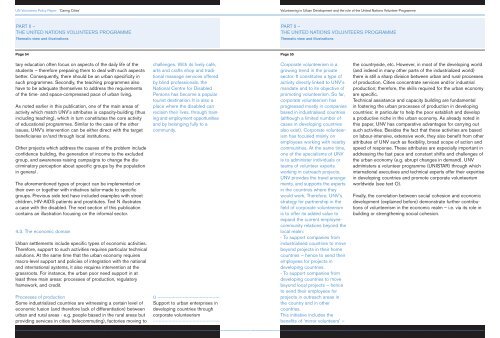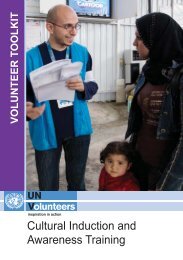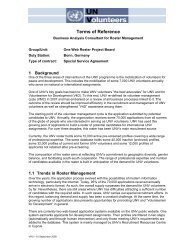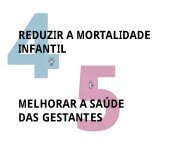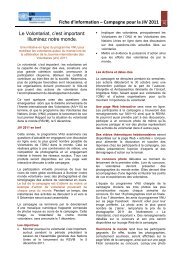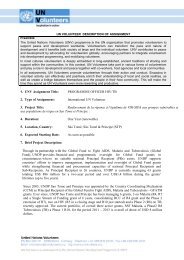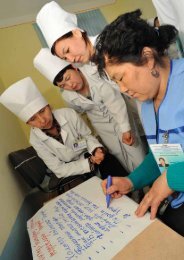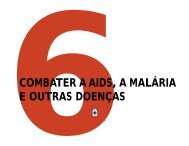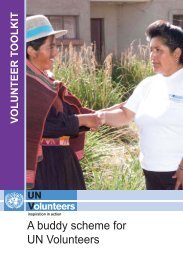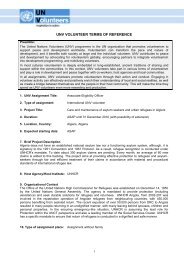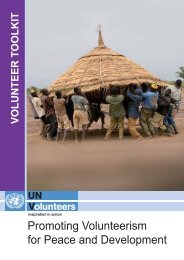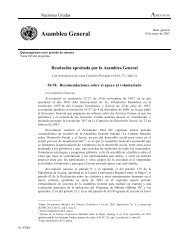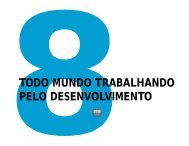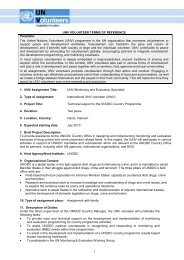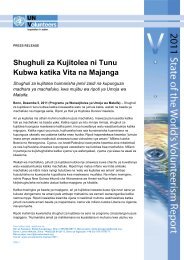View associated PDF document - United Nations Volunteers
View associated PDF document - United Nations Volunteers
View associated PDF document - United Nations Volunteers
Create successful ePaper yourself
Turn your PDF publications into a flip-book with our unique Google optimized e-Paper software.
UN <strong>Volunteers</strong> Policy Paper<br />
‘Caring Cities’<br />
Volunteering in Urban Development and the role of the <strong>United</strong> <strong>Nations</strong> Volunteer Programme<br />
PART II –<br />
THE UNITED NATIONS VOLUNTEERS PROGRAMME<br />
Thematic view and illustrations<br />
PART II –<br />
THE UNITED NATIONS VOLUNTEERS PROGRAMME<br />
Thematic view and illustrations<br />
Page 54<br />
Page 55<br />
tary education often focus on aspects of the daily life of the<br />
students – therefore preparing them to deal with such aspects<br />
better. Consequently, there should be an urban specificity in<br />
such programmes. Secondly, the teaching programmes also<br />
have to be adequate themselves to address the requirements<br />
of the time- and space-compressed pace of urban living.<br />
As noted earlier in this publication, one of the main areas of<br />
activity which match UNV’s attributes is capacity-building (thus<br />
including teaching), which in turn constitutes the core activity<br />
of educational programmes. Similar to the case of the other<br />
issues, UNV’s intervention can be either direct with the target<br />
beneficiaries or/and through local institutions.<br />
Other projects which address the causes of the problem include<br />
confidence building, the generation of income to the excluded<br />
group, and awareness-raising campaigns to change the discriminatory<br />
perception about specific groups by the population<br />
in general .<br />
The aforementioned types of project can be implemented on<br />
their own or together with initiatives tailor-made to specific<br />
groups. Previous side text have included examples with street<br />
children, HIV-AIDS patients and prostitutes. Text N illustrates<br />
a case with the disabled. The next section of this publication<br />
contains an illustration focusing on the informal sector.<br />
4.3. The economic domain<br />
Urban settlements include specific types of economic activities.<br />
Therefore, support to such activities requires particular technical<br />
solutions. At the same time that the urban economy requires<br />
macro-level support and policies of integration with the national<br />
and international systems, it also requires intervention at the<br />
grassroots. For instance, the urban poor need support in at<br />
least three main areas: processes of production, regulatory<br />
framework, and credit.<br />
Processes of production<br />
Some industrialized countries are witnessing a certain level of<br />
economic fusion (and therefore lack of differentiation) between<br />
urban and rural areas - e.g. people based in the rural areas but<br />
providing services in cities (telecommuting), factories moving to<br />
challenges. With its lively café,<br />
arts and crafts shop and traditional<br />
massage services offered<br />
by blind professionals, the<br />
National Centre for Disabled<br />
Persons has become a popular<br />
tourist destination. It is also a<br />
place where the disabled can<br />
reclaim their lives, through training<br />
and employment opportunities<br />
and by belonging fully to a<br />
community.<br />
O --------------------------------------------<br />
Support to urban enterprises in<br />
developing countries through<br />
corporate volunteerism<br />
-----------------------------------------------<br />
Corporate volunteerism is a<br />
growing trend in the private<br />
sector. It constitutes a type of<br />
activity directly linked to UNV’s<br />
mandate and to its objective of<br />
promoting volunteerism. So far,<br />
corporate volunteerism has<br />
progressed mostly in companies<br />
based in industrialised countries<br />
(although a limited number of<br />
cases in developing countries<br />
also exist). Corporate volunteerism<br />
has focused mainly on<br />
employees working with nearby<br />
communities. At the same time,<br />
one of the specialisms of UNV<br />
is to administer individuals or<br />
teams of volunteer experts<br />
working in outreach projects.<br />
UNV provides the travel arrangements,<br />
and supports the experts<br />
in the countries where they<br />
would work. Therefore, UNV’s<br />
strategy for partnership in the<br />
field of corporate volunteerism<br />
is to offer its added value to<br />
expand the current employeecommunity<br />
relations beyond the<br />
local realm:<br />
- To support companies from<br />
industrialised countries to move<br />
beyond projects in their home<br />
countries – hence to send their<br />
employees for projects in<br />
developing countries.<br />
- To support companies from<br />
developing countries to move<br />
beyond local projects – hence<br />
to send their employees for<br />
projects in outreach areas in<br />
the country and in other<br />
countries.<br />
This initiative includes the<br />
benefits of ‘mirror volunteers’ –<br />
the countryside, etc. However, in most of the developing world<br />
(and indeed in many other parts of the industrialized world)<br />
there is still a sharp division between urban and rural processes<br />
of production. Cities concentrate services and/or industrial<br />
production; therefore, the skills required for the urban economy<br />
are specific.<br />
Technical assistance and capacity building are fundamental<br />
in fostering the urban processes of production in developing<br />
countries: in particular to help the poor establish and develop<br />
a productive niche in the urban economy. As already noted in<br />
this paper, UNV has comparative advantages for carrying out<br />
such activities. Besides the fact that these activities are based<br />
on labour-intensive, extensive work, they also benefit from other<br />
attributes of UNV such as flexibility, broad scope of action and<br />
speed of response. These attributes are especially important in<br />
addressing the fast pace and constant shifts and challenges of<br />
the urban economy (e.g. abrupt changes in demand). UNV<br />
administers a volunteer programme (UNISTAR) through which<br />
international executives and technical experts offer their expertise<br />
in developing countries and promote corporate volunteerism<br />
worldwide (see text O).<br />
Finally, the correlation between social cohesion and economic<br />
development (explained before) demonstrate further contributions<br />
of volunteerism in the economic realm – i.e. via its role in<br />
building or strengthening social cohesion.


